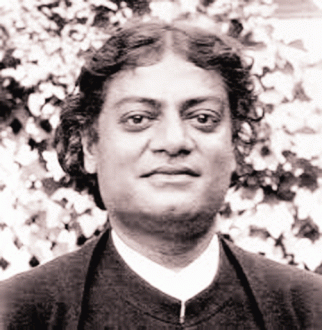SWAMI AND NATIONALISTS. STORIES OF INSPIRATION
- By : Anirban Ganguly
- Category : Articles

Vivekananda’s national appeal was not limited to a section but embraced the teeming millions of India, both high and low, rich and poor; it was all-encompassing and all-inclusive and served to rouse many Indians
In their struggle for freedom, Indian nationalists were deeply inspired by the life and message of Swami Vivekananda. Leading historians have referred to the impact that Vivekananda’s words and work had on the revolutionary movement in India. Through his narrative of a spiritual and material freedom, Vivekananda came to be looked upon by a large section of Indian revolutionaries as a prophet who indicated the path of liberty and of freedom to his subject people. The vision of India he articulated continued to inspire, move and propel young minds to action long after he had physically ceased to be active.
Throughout his tours across India, Vivekananda’s speeches focussed essentially on three aspects. They were, first his sense of a supreme mission which almost appeared as a historical imperative; second, his conviction of the indestructibility of the Indian soul and the invincibility of Indian spirituality; and the third was his belief in nationalism which alone could become an effective and adequate instrument for the fulfillment of India’s destiny. These, in fact, formed the bedrock of his philosophy of Indian nationalism.
Laying the foundation for the crystallisation of Indian nationalism, Vivekananda gave a call at Madras on February 14, 1897, asking all his listeners to worship the motherland alone and exclusively for the next 50 years, and “give up”, he said, “being a slave”. For the next 50 years, “this alone shall be our keynote — this, our great Mother India. Let all other vain gods disappear for the time from our minds”.
Historian of Indian nationalism and political thought, Biman Behari Majumdar, has argued that nothing illustrated the Swami’s “prophetic vision” regarding the freedom of India better than the fact that it was “exactly 50 years” after he had asked his countrymen to worship Mother India that British Prime Minister Clement Attlee announced in the House of Commons on February 23, 1947, his Government’s decision to quit India.
Though Vivekananda had asked his disciples to refrain from direct involvement in politics, it would be unfair to categorically say that he did not concern himself at all with politics or that he had nothing to say about political subjection. He was a keen observer of Indian politics and had his own ideas of revolution, and he radiated a restless concern at the fallen state of his country. The Swami would often be seen getting worked up when discussing India’s degraded condition.
NC Kelkar, editor of the the Mahratta of Pune and a close collaborator of Bal Gandadhar Tilak, while visiting the Swami in Varanasi towards the end heard him speak “with bated breath and wondered at the terrible anguish he was suffering for the cause of India”.
One sees this agony of Vivekananda expressed in a letter he wrote to Mary Hale on October 30, 1899, where he talked of the “terrible massacre the English perpetrated in 1857 and 1858, and still more terrible famines that have become the inevitable consequence of British rule (there never was a famine in a native State)”, and how it killed millions of people. Passionately describing the degenerated state of affairs, Vivekananda lamented how “freedom of the Press [has been] stopped already” and “we have been disarmed long ago”, and how, “for writing a few words of innocent criticism, men are being hurried to transportation for life, others imprisoned without any trial; and nobody knows when his head will be off”.
Unlike some of his leading compatriots of the period, Vivekananda did not propagate loyalty to the British Raj. Any talk of the British ruling India through ‘Divine Dispensation’ drew sarcastic remarks from him. In 1897, during the Jubilee Celebration of the reign of Queen Victoria, when educated Indians vied with one another in trying to express their loyalty to the Queen Empress, Vivekananda, on being requested by a leading Bengali to send an Address of Honour on behalf of the Ramakrishna Mission, consented but cautioned Swami Brahmananda, “It must be free from exaggeration like, ‘Oh Queen. You rule by God’s command’ etc. Such nonsense, as is common to us, natives should be avoided.”
Referring to Vivekananda’s contribution in igniting the flame of revolution in India, Romain Rolland has observed, “The Indian nationalist movement smouldered for a long time until Vivekananda’s breath blew the ashes into flame, and erupted violently three years after his death in 1905.”
Discussing Vivekananda’s and Sri Ramakrishna’s influence on the revolutionary movement in India, Sri Aurobindo once remarked that the “influence of Ramakrishna and Vivekananda worked from behind”, as a result of which the “Movement and the Secret Society became so formidable that in any other country with a political past they would have led to something like the French revolution”.
RC Majumdar, in his monumental History of the Freedom Movement in India, while discussing Vivekananda’s great contribution to the rise of Indian nationalism, argued that the “nascent nationalism in India received a great momentum from the life and activities of Swami Vivekananda”. In his assessment of Vivekananda’s historic role in this awakening, Majumdar observed that Vivekananda combined in himself the “role of a great saint and a fervid nationalist” who “placed Indian nationalism on the high pedestal of past glory”.
Yet Vivekananda’s national appeal was not limited to a section but embraced the teeming millions of India, both high and low, rich and poor; it was all encompassing and all inclusive and served to rouse a cross section.
Historian Ainslie T Embree noted that while the Swami’s work “to restore to his people a sense of pride in their own past was perhaps Vivekananda’’ greatest contribution to the nationalist movement, scarcely less important was his insistence that the ideals of strength and freedom necessary for nationalism could be found within the Hindu tradition”.
Political philosopher VP Verma has argued, “As a theorist and teacher, Vivekananda [had] given to the country the ideal of fearlessness and strength…To preach the gospel of strength and fearlessness to a politically prostrate nation [was] to impart a message of great political significance…”
The Swami was also seen as an “embodiment of emotional patriotism [who] had established almost a sense of identity-consciousness with the country, its peoples and its historic ideals”.
As Ramakrishna once said, “He [Narendra] has lighted the fire. Now it doesn’t matter whether he stays in the room or goes out.” In his brief life, Vivekananda had lighted the fire of Indian revolution, and that fire of sacrifice burnt steadily and eventually liberated India.

















